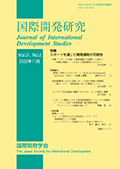Volume 31, Issue 2
Displaying 1-16 of 16 articles from this issue
- |<
- <
- 1
- >
- >|
Special Issue: The Potential for Development Assistance through Sport
-
2022Volume 31Issue 2 Pages 1-2
Published: 2022
Released on J-STAGE: December 29, 2022
Download PDF (931K)
-
2022Volume 31Issue 2 Pages 3-16
Published: 2022
Released on J-STAGE: December 29, 2022
Download PDF (1142K) -
2022Volume 31Issue 2 Pages 17-30
Published: 2022
Released on J-STAGE: December 29, 2022
Download PDF (1568K) -
2022Volume 31Issue 2 Pages 31-46
Published: 2022
Released on J-STAGE: December 29, 2022
Download PDF (1304K) -
2022Volume 31Issue 2 Pages 47-60
Published: 2022
Released on J-STAGE: December 29, 2022
Download PDF (1697K)
Note
-
2022Volume 31Issue 2 Pages 61-76
Published: 2022
Released on J-STAGE: December 29, 2022
Download PDF (1201K)
Discussion
-
2022Volume 31Issue 2 Pages 115-127
Published: 2022
Released on J-STAGE: December 29, 2022
Download PDF (1139K)
Book Reviews
-
2022Volume 31Issue 2 Pages 77-83
Published: 2022
Released on J-STAGE: February 10, 2024
Download PDF (1015K) -
2022Volume 31Issue 2 Pages 84-86
Published: 2022
Released on J-STAGE: February 10, 2024
Download PDF (990K) -
2022Volume 31Issue 2 Pages 87-90
Published: 2022
Released on J-STAGE: February 10, 2024
Download PDF (997K) -
2022Volume 31Issue 2 Pages 91-94
Published: 2022
Released on J-STAGE: February 10, 2024
Download PDF (997K) -
2022Volume 31Issue 2 Pages 95-98
Published: 2022
Released on J-STAGE: February 10, 2024
Download PDF (994K) -
2022Volume 31Issue 2 Pages 99-100
Published: 2022
Released on J-STAGE: February 10, 2024
Download PDF (986K) -
2022Volume 31Issue 2 Pages 101-105
Published: 2022
Released on J-STAGE: February 10, 2024
Download PDF (999K) -
2022Volume 31Issue 2 Pages 106-110
Published: 2022
Released on J-STAGE: February 10, 2024
Download PDF (1000K) -
2022Volume 31Issue 2 Pages 111-114
Published: 2022
Released on J-STAGE: February 10, 2024
Download PDF (994K)
- |<
- <
- 1
- >
- >|
